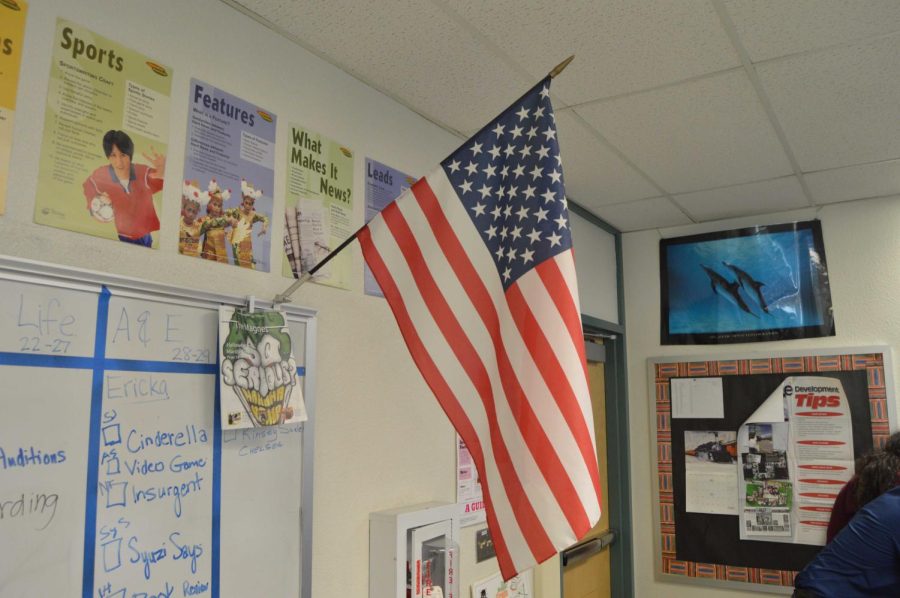Pledge of Allegiance at WCHS: To stand or not to stand?
Symbols of patriotism like the US flag stand in virtually every room of the WCHS building. Yet, this has not stopped the increasing apathy towards “patriotic” acts such as standing for the Pledge.
March 10, 2022
It’s the end of second period. Students are packing up their things and pulling out their phones, eager to respond to text messages or play games. Teachers are preparing for their next class while constantly reminding students that the bell hasn’t rung yet. In the midst of this chaos, the school announcements come on. The first thing in the announcements? The Pledge of Allegiance.
Those 31 words have been said by countless students in the United States since its creation in 1892. Yet, for a variety of reasons the popularity and integrity of the Pledge has come under question over the last few years. Every student interprets it differently. Some believe that the values the Pledge stands for aren’t accurately represented in today’s society, while many students still believe that the values of the Pledge are important reminders of American freedoms.
“Our social studies classes teach us about countries around the world that don’t have the rights and liberties that we have as American citizens,” WCHS sophomore Jack Groban said. “So, it’s important that we recognize our freedom and are thankful for it.”
Similarly, many students believe that the Pledge symbolizes the optimism and hope of the American Dream. In our diverse community, some students who are the children or grandchildren of immigrants stand for the Pledge in order to honor the opportunities this country gave their ancestors.
“My grandparents are Indian immigrants who had always dreamed of starting a life for their children and future generations in America,” WCHS junior Nishu Shah said. “I stand because America was a land of opportunity for them and it continues to remind me of how grateful I should be.”
Respect for those serving our country is also a reason some students stand for the Pledge. As a school near Washington D.C, WCHS has a sizable population of students whose parents work in the service of our country. It also goes without saying that without those who serve our country, the liberties citizens in this country have would not be the same.
“To me, the Pledge symbolizes respect for our country and gives recognition to people who have fought for our country and continue to fight everyday so we can practice our rights freely,” Shah said.
Despite these reasons, there are also students who choose not to stand for the Pledge. While the first thing that comes to mind in regards to sitting during the Pledge might be a form of political protest, many students simply are either unaware or unsure of what they are representing when they stand for the pledge.
“I don’t stand for the pledge because I’m not sure what I’m truly representing if I stand,” WCHS freshman Charlie Kustner said. “The pledge also doesn’t really have any meaning to me.”
Apathy regarding the pledge in high schools is certainly a change, especially considering the fact that many students grew up going to elementary and middle schools that highly encouraged standing for the Pledge. There are many reasons why this apathy exists, and each student has their own reasoning.
“I think the pledge is viewed differently in high school because the teachers no longer require you to stand,” Kustner said. “Additionally, kids have a better understanding of their morals and values which may not align with those of the pledge. Of course, there’s also the possibility they don’t really care about it.”
In addition, another reason for this apathy might be the bandwagon effect. Even if one holds strong beliefs, it might feel awkward or even embarrassing to be the only one sitting or standing in the classroom during the Pledge.
“Whether my peers stand or sit for the Pledge definitely affects what I end up doing,” Groban said. “When others stand for the Pledge, I feel as if I’m not alone with my sentiments. When others are sitting , it feels more uncomfortable to be the only one in the room standing for my beliefs.”
No matter what one believes about the integrity of the Pledge or whether it is worth standing for, there is no correct answer. Our country is based on the right to free speech and petition, meaning that saying the Pledge doesn’t make a person any more patriotic or American than another. Instead, what makes one an American is partaking in the freedoms that this country has given us.
“To me, the Pledge of Allegiance demonstrates the rights we as students have in America. Everyone has their own opinions about it, but in the end I think it’s about respecting the rights our country gives us” Groban said.



